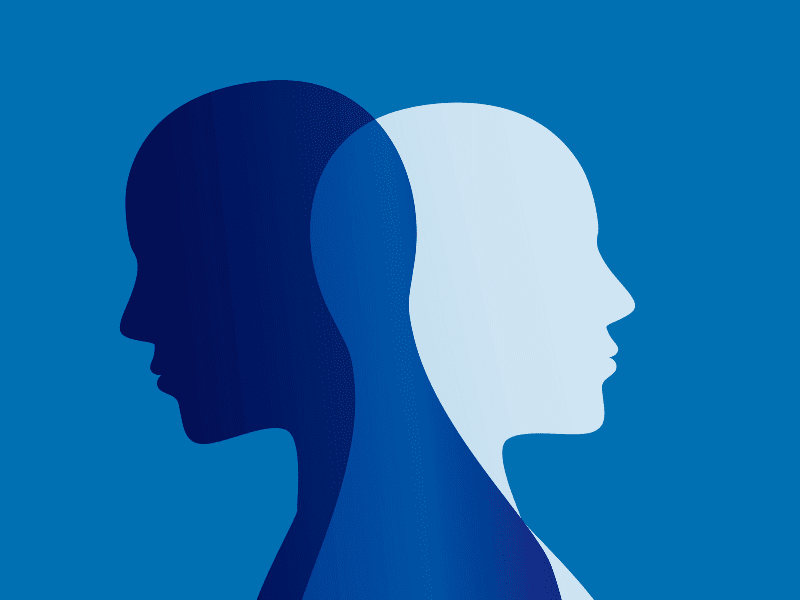Dual Diagnosis for Teens
Learn more about co-occurring disorders for teens.
When an individual is struggling with both a mental health disorder and a substance use disorder, the two conditions are referred to as “co-occurring disorders,” or “dual diagnoses.”
This situation is quite common. According to a Journal of the American Academy of Child and Adolescent Psychiatry study, 82 percent of teens who entered a treatment program for addiction also met the criteria for a mental health disorder.
Often, mental health issues can lead to a substance use problem: a teen or young adult who is feeling depressed might turn to marijuana to numb the feeling.
And sometimes substance use can actually trigger a mental health issue, latent schizophrenia may emerge in the early adult years as a result of drug use.These two types of disorders can greatly influence and exacerbate each other.
Both causes and symptoms of mental health issues and substance abuse can look very similar:
Because of the overlap in symptoms, it’s very important to accurately assess and treat both challenges together. If not treated this way, recovery can be much more difficult, as treatment may only be focusing on one half of the problem.

Start on the path towards recovery today.

An individual can attend an alcohol rehab program, but never address the underlying anxiety disorder. While they may learn to stop drinking, the root of the issue isn’t addressed and another substance or unhealthy pattern may come into their life to cope with the anxiety.
Conversely, many people seek help for mental health disorders, not fully comprehending that their substance use may be greatly contributing to their mental health in a negative way.
If you or your loved one is working towards recovery and a whole, healthful life, it’s important to find a support program that understands and treats co-occurring disorders.
In the United States, mental health issues are quite common.
A 2012 Substance Abuse and Mental Health Services Administration survey revealed that more than 19% of the Americans over age 18 have struggled with mental health symptoms. Some of the most common disorders include:
Individuals diagnosed with ADD and ADHD have a difficult time concentrating, focusing, and sometimes sitting still. Their minds tend to be incredibly busy. The prescription drugs developed to treat ADD and ADHD are stimulants, which can contribute to anxiety. People with this disorder may also use illicit stimulants to support focus and self-medicate.
Depression can present in many ways depending on the severity, but is associated with sad, irritable, or empty mood, as well as loss of pleasure in activities. People experiencing depression often feel they have lost the passion or spark in their life and they have a hard time motivating.
Depression can be situational, for example, as a result of a large life transition or grief that is not fully processed, or can be a longer-term phenomena not tied to a certain event. A family history of depression increases a person’s risk, as does temperament and adverse childhood experiences. Many different substances are used to cope with depression, including alcohol, marijuana, stimulants such as coffee or cocaine, and prescription anti-depressants.
Previously referred to as manic-depressive
Bipolar disorders are characterized by large swings between depression and mania. The timing of episodes may vary greatly. It is important to note that this diagnosis is not applied to people who experience these symptoms as a result of taking prescribed medication or un-prescribed substances.
It is not uncommon for people who are experiencing large swings in mood and energy to seek a substance to help balance them out or increase feelings of euphoria in the case of a manic episode. Of course, what is intended to help often exacerbates the problem or creates further consequence for the person suffering from this disorder.
Panic attacks, obsessive compulsive disorder, social anxiety, and phobias
Characterized by excessive fear or anxiety.
The experiencer tends to be worried and has a difficult time settling down. Individuals with anxiety disorders often self-medicate with substances that in the short-term help them feel more calm. These are often depressants such as alcohol, marijuana, or prescription drugs.
Many people with personality disorders have an internal thought or behavior pattern that keeps them from relating. Often people diagnosed with personality disorders lack a coherent sense of self, have difficulty relating to others, and have a painful day-to-day experience. It is not surprising then that many people who fit into this diagnostic category turn to substances for soothing and numbing.
If left untreated, many young people with mental health disorders may find themselves “self medicating”, using any of the above or additional drugs to help them cope with the symptoms of the disorder. This can create a whole other host of challenges on top of the mental illness that can require co-occurring disorder treatment.


Our virtual IOP program offers the same programming that we offer in person, all online – this is ideal for those who live too far to drive to an addiction center, have transportation issues, or have health concerns that make in-person treatment challenging.
If you think you or your loved one may have a co-occurring disorder, seek treatment.
Both mental health and substance abuse are challenges that are workable and there are many resources available. When looking for programs or professionals to support your recovery, be sure to ask about their experience in managing dual diagnosis / co-occurring disorders.
Should you or your loved one enter co-occurring disorder treatment, advocate for a course of care that gives attention to both mental health and substance abuse. If you think that your troubled teen may need drug rehab as well as help with a dual diagnosis, reach out for help.
Our team is happy to answer any questions you might have and guide your journey to health with professional care and intelligent compassion.

Many people who struggle with a mental health disorder may turn to substances to help cope or numb the negative challenges, and sometimes substance use can incur a mental health issue.
They are often two sides of the same coin, and often work together to create a vicious negative cycle.
There is new research suggesting that some of the propensity for both mental health issues and for substance abuse may be genetic. Environmental stressors and access to substances are also factors that contribute to co-occurring disorders.
With both substance use and mental health disorders, individuals can experience greater amounts of stress, which they then often attempt to alleviate in unhealthy ways, making the problem worse.


One of the insidious risks of co-occurring disorders is one’s inability to form healthy coping or soothing skills. If someone is struggling with depression they may be self-medicating with a substance like marijuana.
Instead of tending the root of the mental illness or learning healthy coping methods (exercise, emotional processing, social connection, etc), they turn to the substance and lose the opportunity to build the skills necessary for future mental health and resiliency.
The substance can become their only support, and one that often proves to be detrimental and unsustainable.
There has been extensive research into the effects and risks of drug use on young brains and bodies, and if a mental health disorder is occurring at the same time, those risks can be multiplied. Many mental health disorders may be the result of a difference in brain chemistry, and adding mind altering substances to that mix only increases the chance for more problems down the line.
Mental health disorders can be managed and even eliminated; set yourself or your loved one up for success by becoming educated and getting help as soon as possible.
In addition, some substances have been shown to increase or even trigger mental health disorders. Schizophrenia, bipolar, and other mental health disorders can be “turned on” by different drugs, and even marijuana has been recorded to induce psychotic episodes.
The Continuum of Care
Access a full range of treatments for mental health and substance use disorders. Whether you need a safe transitional living community, inpatient care, or outpatient therapy, we have a program to help.